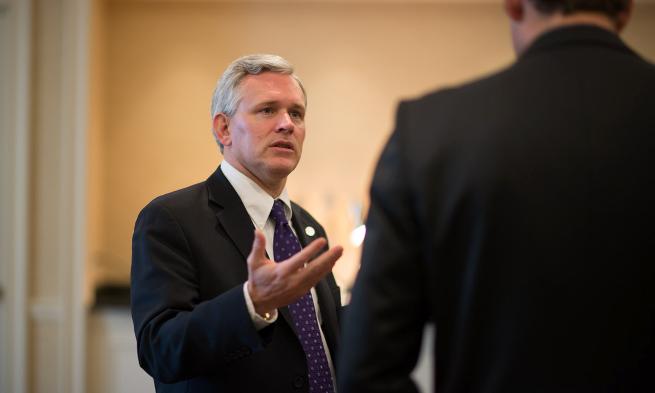"Why Madison?" Tampa
News
"Why Madison?"
President's Journal
Tampa
Feb. 18, 2013
Central Florida alumni turn out in Tampa
Tonight, we are here in Tampa, Fla., as JMU alumni of the central Florida area turned out to share their ideas about why Madison matters. It's a beautiful location, the Marriott, overlooking the bay, a great place to come together and talk about JMU.
Faculty-student relationships a time-tested strength
We heard tonight in very interesting and different ways from people who graduated at very different times. What is becoming clear is that faculty-student interaction is a time-tested hallmark of the Madison Experience—that close sense of community where students really have an intense learning experience where they can get to know faculty and have those one-on-one conversations that can change lives. It was great to hear an '09 grad—a fairly recent graduate—talking about that, and then a class of '72 grad—from a very different time in Madison's history—say, "I'm so happy to hear that because that resonates with me. That was what my experience was like." Even as the university has grown and evolved over the years, I'm thrilled to hear that from these two alumni that the character of the university is the same. It was wonderful to hear that intergenerational connection tonight and to hear from people that through the years, that quality has been one of the central features of JMU—and it matters. It matters to all of our students. It matters to all of our alumni and they want to see us maintain that as we go forward.
Madison celebrities Cline and Reid advocate retaining top faculty
What a treat it was to have Paul Cline, who taught for so many years in the Political Science department, and Bob Reid, the former dean of the College of Business, both here to participate in this event. Neither of these gentlemen had to be here. It says something about the university that they still feel connected to JMU and want to maintain their ties with Madison. They wanted to be here to participate in the conversation. One of the themes that they illustrated—that they helped us to talk about—is our faculty and the importance of recruiting and retaining world-class faculty at a time when we're competing not only with universities in Virginia, not just with universities around the country, public and private, but also internationally with universities all over the world. It was a reminder that, when we think about resources, we've got to take very seriously the need to think about recruiting world-class faculty and what it's going to take to compete in this global marketplace. We can't take it for granted. That's what we were hearing tonight. We can't just assume that if we keep doing things the same way that we've done in the past that we'll continue to be successful in that marketplace. It was an important reminder as we think about developing a culture of philanthropy that one of our top priorities has got to be recruitment and retention of top quality faculty in all of the different disciplines across the university. What better examples than to have a former dean and a former faculty member here to talk about that with us.
JMU alumni want to give back to the university
We heard a very clear message from our donors who attended tonight that JMU alumni want to give and are willing to give when they feel connected to a cause, a particular need, not just a generic call for giving. The fact of the matter is we have thousands of different funds with all the different schools, the different departments across campus, each with a lot of different, very specific needs that you can give to and support. What we heard we need to do, though, is connect those with people who share that passion, who share that interest, whether it's a club, an organization, a particular academic discipline or major, a faculty chair or faculty line that needs support. There are so many ways that we can connect with people, and that's what we need to continue to explore. We heard tonight from people who said, "Look, if I knew there was a particular need in that corner of the university that I could relate to, that I care about, I would take out my checkbook or I'd give online that day if I heard about that specific need." That's what seems to resonate with people, so we've got to think about how we make those connections, to reach people where they are, where their passions are. We must think about all those different needs and educate people about Madison's needs and the many different priorities that we have at the university.
